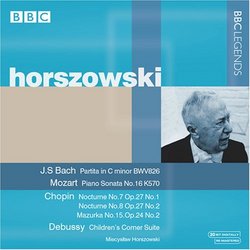| All Artists: Johann Sebastian Bach, Frederic Chopin, Claude Debussy, Wolfgang Amadeus Mozart, Mieczyslaw Horszowski Title: J.S. Bach: Partita No. 2; Mozart: Piano Sonata, K 570; Chopin: Nocturne Op. 27 No. 1; Etc. Members Wishing: 0 Total Copies: 0 Label: BBC Legends Original Release Date: 1/1/2007 Re-Release Date: 4/24/2007 Genre: Classical Styles: Chamber Music, Forms & Genres, Sonatas, Suites, Historical Periods, Baroque (c.1600-1750), Classical (c.1770-1830), Modern, 20th, & 21st Century Number of Discs: 1 SwapaCD Credits: 1 UPC: 684911420326 |
Search - Johann Sebastian Bach, Frederic Chopin, Claude Debussy :: J.S. Bach: Partita No. 2; Mozart: Piano Sonata, K 570; Chopin: Nocturne Op. 27 No. 1; Etc.
 | Johann Sebastian Bach, Frederic Chopin, Claude Debussy J.S. Bach: Partita No. 2; Mozart: Piano Sonata, K 570; Chopin: Nocturne Op. 27 No. 1; Etc. Genre: Classical
|
Larger Image |
CD Details |
CD ReviewsNOT JUST GREAT PIANO-PLAYING - GREAT MUSIC MAKING Klingsor Tristan | Suffolk | 04/25/2007 (5 out of 5 stars) "Throughout this recital one has to keep reminding oneself that this is the playing of a man in his mid-nineties. The control - of rhythm, of phrasing, of colour - is more than worthy of a player a quarter of his age. Add to that a (very long) lifetime of experience and understanding of these composers and you have some exceptional piano playing.
Perhaps just as surprising is the mastery across such a very broad range of repertoire. This conflation of two Aldeburgh Festival recitals from 1983 and 1984 ranges from the precise articulation of a Bach Partita to the impressionist world of Debussy. And yet Horszowski has the measure of them all - in intellect, in emotional weight, in tonal palette. His Bach is a sheer delight. Even within the Baroque style, he still manages to find the character and `tinta' of each of the different dance-forms that make up the Partita; limpidly flowing in the Allemande, fleet and electrically alive to the counterpoint of the Courante, measured and profound in the Sarabande, witty and sharp for the Rondeaux. The Mozart Sonata is characterised by the kind of sublime simplicity that only comes from a deep understanding, not just of the notes, but of the music. Just listen to the benison those long phrases in thirds brings to the slow movement or to the unforgettable lift and bounce he gives to the rhythms of the Finale. Then there is his Chopin. Himself a Pole by birth and later an exile just like the composer (and, incidentally, like that other great Chopin pianist, Rubinstein), Horszowski combines the best of the `old' traditions of Chopin playing with an innate understanding of what makes this music work, what lies behind the soothing nocturnal melodies and harmonies, the darkness and pain of an exile - particularly in the turbulent middle-sections of these Op.27 Nocturnes. As the note-writer observes, Horszowski has the almost unique ability to provide different colours and tonal properties to the separate lines of this music, digging deeper into the `meaning' (if that's the right word) of these pieces. And then there is a magical lightness of step in a Mazurka rooted in its Polish folk origins. Finally, there is the Debussy. Not for him the immaculate sheen of a Michelangeli with each note precisely coloured. Under Horszowski's fingers, these supposedly children's pieces have a maturity that manages to communicate childish innocence and adult experience at one and the same time - the loneliness of The Little Shepherd, the quietude of the snow falling, the humour of the Golliwog, even an aching melancholy behind the Dr. Gradus' finger exercises. This is a disc not just for lovers of great piano playing (though there is much here to delight them), but above all for lovers of music. A very special disc indeed." |

 Track Listings (18) - Disc #1
Track Listings (18) - Disc #1